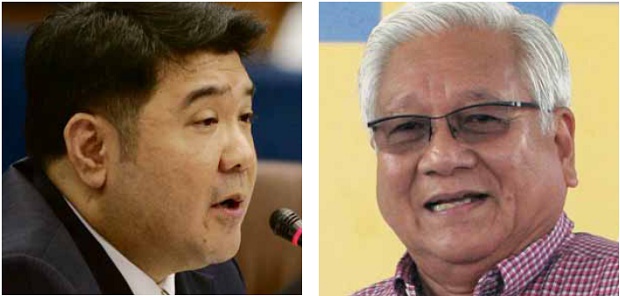‘Suspend all STL operations’

PCSO Chair ErineoMaliksi (right) accuses its five-man board led by Ferdinand Rojas II of blocking his reforms.
Chair Erineo “Ayong” Maliksi of the Philippine Charity Sweepstakes Office called on members of the PCSO board to suspend the operations of 17 Small Town Lottery (STL) franchise holders and the issuance of more franchises until after the management has addressed the findings of the National Bureau of Investigation.
At Wednesday’s hearing of the House committee on games, Maliksi accused his five fellow directors in the PCSO, led by General Manager Jose Ferdinand Rojas II, of stonewalling on his proposed reforms in the STL business.
An NBI report has found that “jueteng” lords have made the STL network their front to continue their numbers racket. STL operators have also defrauded the PCSO of at least P50 billion a year by underdeclaring actual sales, according to the same report.
Maliksi said the PCSO board members not only ignored the NBI report but also questioned his authority to seek the NBI’s help in investigating STL operations.
Instead of suspending the operations of STL, Maliksi said the majority of the PCSO board approved two more licenses in Marinduque and Bohol provinces in August.
Article continues after this advertisementA fed-up Maliksi wrote Ombudsman Conchita Carpio Morales last month to investigate Rojas and other PCSO-STL executives for allowing the STL to be coopted by jueteng lords.
Article continues after this advertisementMaliksi proposed the following to reform the STL business:
Conduct the STL bets on a national or regional basis similar to lotto draws rather than per province.
STL draws should be televised.
All sales should be coursed through hand-held gadgets or the PCSO-prescribed “papelitos,” or betting forms.
Force corporations or STL licensees to cover the shortfalls in their revenues as targeted by the PCSO.
Maliksi said that STL, which was introduced nine years ago, should have generated P60 billion in annual revenues instead of the P4.7 billion it earned last year.
Paltry
“The earnings from STL continue to be paltry every year due to the failure of STL operators to use handheld terminals or point-of-sale (POS) gadgets; nonuse of the prescribed betting forms or papelitos; drawing of winning bets outside authorized centers; absence of a master list of authorized bet collectors; and a lack of audit on STL operators,” he said.
Cavite Rep. Elpidio Barzaga, chair of the House committee on games, said the PCSO board should heed the appeal of Maliksi to suspend STL operations.
Barzaga said it was the duty of the PCSO to ensure the integrity of STL operations and not allow the game to be placed under the control of people it was supposed to ease out of business.
Like jueteng, STL involves betting on two-number combinations.
Issue against Rojas
Aside from mismanagement, Rojas and his management team were accused of abuse of funds (through frequent travels), delays in meeting the needs of its beneficiaries for medicine and hospitalization, and centralization of the grant of benefits to select top officials.
Rojas, who was seated beside Maliksi during the hearing, did not address the latter’s allegations in his opening statement except for PCSO’s failure to pay its liabilities to hospitals.
Rojas pointed out that the PCSO had even overpaid state-run Philippine General Hospital.
At the hearing, NBI special investigator Ferdinand Manuel said the NBI probe of STL operations in Nueva Ecija, Laguna, Batangas, Bulacan, Quezon, Zambales and Pampanga provinces confirmed the violations committed by STL operators.
Procedural violations
Manuel, however, said that while illegal operators in the STL centers were invited for questioning, no criminal charges were filed because the violations were procedural and not criminal.
Manila Rep. Amado Bagatsing and Laguna Rep. Dan Fernandez questioned the basis of the report that the STL operators cheated the government of P50 billion in potential revenues.
Manuel said the NBI report did not state that the PCSO cheated the government of P50 billion.
Bagatsing and Fernandez said the NBI should not have made a big deal out of the matter because it was just an issue of implementing regulations rather than of criminal activity.